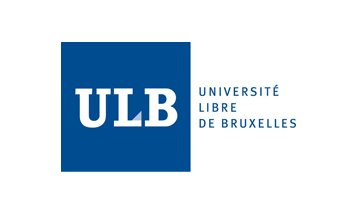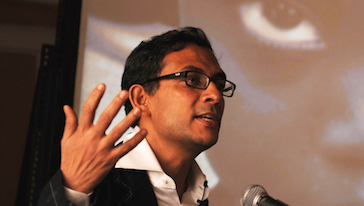Prof. Abhijit Banerjee began his presentation by honoring one of his intellectual heroes, the Polish reporter and writer Ryszard Kapuscinski, after whom the series Kapuscinski Development Lectures is named. By quoting a significant phrase[1] from Kapuscinski’s book, The Shadow of the Sun, Prof. Banerjee emphasized the fact that unsuccessful rulers are often the victims of their own “thoughtlessness”. In order to demonstrate this belief, Prof. Banerjee referred to Kapuscinski’s example of Samuel Doe, the 21st President of Liberia. The latter was a greedy man who had absolutely no idea on how to rule a country or even how to remain in power. As Kapuscinski describes in his book, Doe’s complete lack of ideas and action should be regarded as the main cause of his downfall.
A. Political economy
After having introduced Kapuscinski’s way-of-thinking, Prof. Banerjee continued his lecture by presenting a fairly dominant view among political economists, namely the institutionalist view. On the basis of Acemoglu and Robinson’s book, Why Nations fail, Prof. Banerjee explained that a nation’s economic success is hugely determined by its political institutions. This institutionalist view argues that good politics will enable good policies while bad politics will generate bad policies. In this light, Prof. Banerjee stressed the importance of the vision of history by design. In other words, the political system (whether good or bad) will determine the choices made by the politicians and thus the policy of a country.
Prof. Banerjee then carried on by contrasting the view of “history by design” to the one of “history by accident”. He argued that a lot of things are the consequences of “accidents”, i.e. people, who have no idea on how to make important decisions, find themselves at the wrong place and at the wrong time. In short, they are simply there by accident. By looking at the evidence on the ground, Prof. Banerjee’s strongly believes that the view of “history by accident” is the more current one.
Indeed, he argued that “history by design” is not always correct: good politics do not necessarily translate into good policies and bad politics do not necessarily generate bad policies. Prof. Banerjee’s argument is based on the fact that there is nothing inevitable about bad or good politics. If you believe in this broad inevitability, then countries that are stuck because of bad institutions (and politicians) will simply remain stuck.
In order to change the order of things, Prof. Banerjee proposed several different views:
- Paul Romer argues that the only way to get out of this problem is to subcontract a part of your country to people who know how to do it.
- Paul Collier believes in invasion or military intervention.
- William Easterly maintains that countries and people should be left alone to find their own way.
With these views in mind, Prof. Banerjee argued that there is a lot of slack within the political game and “that even taking the politics as given, there is tremendous slack for better policy”[2]. He continued by emphasizing that even small interventions can create the biggest institutional changes. Even in autocratic countries, like Brazil, Mexico and China, small democratic changes can happen. For example, in China, it was demonstrated that poor policies (such as the one-child policy) were implemented differently in villages where elections had been held.
Prof. Banerjee also pointed at failures within good institutions and provided the audience with the example of Brazil, which transitioned into a democracy twenty years ago.
At this point, one might think that democracy has been established. Nevertheless, Brazil had a complicated paper ballot system, which caused to be a problem for illiterate people and led to 11% of the votes being rejected. As a consequence, Brazil then introduced an easier electronic ballot system. Suddenly, these 11% of votes were taken into consideration. Such a change resulted into an increase of health expenditure as poor people’s votes were taken into consideration. Prof. Banerjee’s point was that we should not always take as given the fact that good systems are good simply because there is a democracy; but because there are a lot of details that enter into the making of such a good system
Prof. Banerjee then carried on with another example: ethnic voting. According to some, democracy is not always sufficient as some people might cast their vote based on ethnicity. He provided the audience with a field experiment conducted in Benin by Prof. Leonard Wantchekon. During the democratically contested presidential election, Prof. Wantchekon chose one candidate who was sure to win and asked him to deliver an ethnical-oriented message in one village and a public-policy message in another one. There seemed to be no difference, suggesting that democracy might not work in these places.
However, an experiment in India, conducted by Prof. Banerjee and his team, demonstrated that some people do not determine their votes on ethnicity but on casts. Indeed, in some villages, they even delivered the message: “do not vote on casts, vote on issues”. As a result, they noticed a drop in ethnic voting. Prof. Banerjee explained that it is often believed that democracy cannot function in one country while it can in another because of people’s behavior. According to him, the real problem is information: voters know very little or nothing about the candidates. Another experiment in the city of Delhi proved him right: when report cards on the candidates in randomly chosen locations were handed out, a sharp drop in votes for the candidates who did not spend money in the interest of the people was noticed.
Prof. Banerjee then went back to the example of Brazil, where Claudio Ferraz and Frederico Finan studied the impact of random audits held in municipalities to fight corruption. Overall, when the results were revealed after an election, the voting pattern did not change, whereas that happened before, had a bigger impact. This indicated that voters had no idea of what was going on.
Prof. Banerjee argued that rather than thinking in terms of good or bad systems, we have to accept that all systems are potentially bad and that we should try to make them better. According to him, we tend to think too much in systemic terms. We theorize things without actually looking at what is driving them.
B. Economic policies
Prof. Banerjee also stressed that bad policies do not just happen because of bad intentions. He argued that corruption and inefficiencies are caused by a lack of understanding and attention to details.
In order to exemplify his argument, Prof. Banerjee referred to the health checks organized by the health administration in the state of Bihar in India. The number of government teams sent to carry them out was, however, too small and this resulted in very few information being collected in the end. The program had not been designed well enough.
With his second example, Prof. Banerjee argued that corruption is not always the main reason for the country’s undeveloped status. India has several anti-poverty programs that allows poor people to receive aid from the government. Along with his team, Prof. Banerjee was asked to design a way to target the poor. In one village, they asked the village elite to point out the poorest people, while in another one they held a meeting with all the villagers. Overall, most people could not identify the poorest ones of their village. Prof. Banerjee explained that they had theorized the problem wrong. They had thought that the problem was corruption, whereas in fact it was the process of ranking the rest of the village that was tiring. Prof. Banerjee stressed that one of the dangers of thinking in terms of good and bad politics is that the problem often lies elsewhere.
C. Against political economy: from good policies to good politics
Prof. Banerjee started his argument with an example about women leaders in India, where there is a lot of male and female prejudice against women, particularly in politics. As a result, quotas exist for women to be the head of local governments. In the villages that had a woman as chief, men tended to switch their opinion completely. In other words, as Prof. Banerjee explained, such a policy change involving imposed quotas will expose people to women leaders and ultimately change their view.
Coming back to the example of Benin, Prof. Wantschekon hosted a conference where candidates discussed policies with several experts and crafted their own policy set. They then delivered an ethnical-oriented message while presenting a full package of policies for the country. The latter had far more success. Prof. Banerjee claimed again that while we take the political system for granted it is also as much subject to intervention.
D. Conclusion
To put in a nutshell, Prof. Banerjee declared that people get themselves into an intellectual trap when thinking into these absolute categories of institutions. Indeed, there are all kinds of failures, even within the “good” institutions (see examples above). Prof. Banerjee concluded that if we take the institutions of these countries as given and basically make ourselves buy standards rather than saying most countries have bad policies, not particularly by design but because of accidental failures, we delay the process of removing poverty by many years. For this reason, he emphasized that we need to be present and wisely intervene on an intellectual level, and not simply overbear through the policy process.
[1] “[…] history is so often product of thoughtlessness: it is the offspring of human stupidity, the fruit of benightedness, idiocy and folly. In such instances, it is enacted by people who do not know what they are doing.”
[2] Prof. Abhijit Banerjee: “Policies, Politics, Can evidence play a role in the fight against poverty?”. Power Point Presentation. Slide 3. May 2011.






